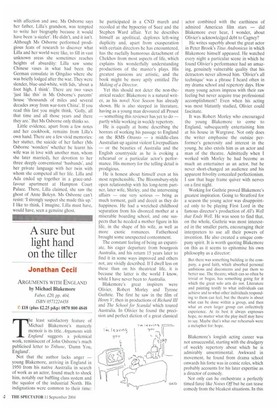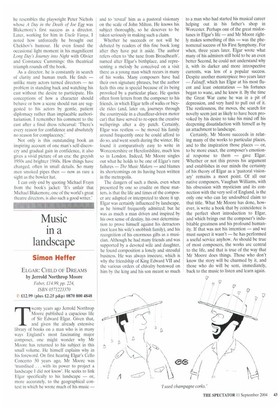A sure but light hand on the tiller
Jonathan Cecil
ARGUMENTS WITH ENGLAND by Michael Blakemore Faber, 120, pp. 404, ISBN 0571224458
C18 (plus 12.25 p&p) 0870 800 4848
The least satisfactory feature of Michael Blakemore's masterly memoir is its title. Arguments with England suggests a polemical work, reminiscent of John Osbome's much publicised letter to Tribune, 'Damn You, England'.
Not that the author lacks anger — young Blakemore, arriving in England in 1950 from his native Australia in search of work as an actor, found much to shock him, notably our baffling class system and the squalor of the industrial North. His indignations were common to their time:
he participated in a CND march and recoiled at the hypocrisy of Suez and the Stephen Ward affair. Yet he describes himself as apolitical, deplores left-wing duplicity and, apart from exasperation with certain directors he has encountered, has the ruefully humorous detachment of Chekhov from most aspects of life, which explains his wonderfully understanding productions of the master's plays. His greatest passions are artistic, and the book might be more aptly entitled The Making of a Director.
Yet this should not deter the non-theatrical reader: Blakemore is a natural writer, as his novel Next Season has already shown. He is also steeped in literature, having as a young man devoured all Proust — something this reviewer has yet to do — partly while working in weekly repertory.
He is equally at home describing the horrors of working his passage to England on the RMS Otranto — a middle-class Australian up against violent Liverpudlians — or the beauties of Australia and the English countryside as he is evoking a rehearsal or a particular actor's performance. His memory for the telling detail is prodigious.
He is honest about himself even at his most reprehensible. The Bloomsbury-style open relationship with his long-term partner, later wife, Shirley, and the intervening affairs — one very serious — bring as much torment, guilt and deceit as they do happiness. He had a wretched childhood separation from his divorced mother at a miserable boarding school, and one suspects that he needed a mother figure in his life, in the shape of his wife, as well as more exotic romances. Fatherhood brought some unexpected contentment.
The constant feeling of being an expatriate, his eager departure from bourgeois Australia, and his return 15 years later to find it in some ways improved and others not, are vividly described. If I dwell less on these than on his theatrical life, it is because the latter is the world I know, while I have never been to Australia.
Blakemore's great inspirers were Olivier, Robert Morley and Tyrone Guthrie. The first he saw in the film of Henry V, then in productions of Richard III and The School for Scandal which toured Australia. In Olivier he found the precision and perfect diction of a great classical
actor combined with the earthiness of admired American film stars — did Blakemore ever hear, I wonder, about Olivier's acknowledged debt to Cagney?
He writes superbly about the great actor in Peter Brook's Titus Andronicus in which Blakemore himself appeared. He watched every night a particular scene in which he found Olivier's performance had an amazing, genuinely vulnerable quality that his detractors never allowed him. 'Olivier's all technique' was a phrase I heard often in my drama school and repertory days. How many young actors impress with their raw feeling but never acquire true professional accomplishment? Even when his acting was most blatantly studied, Olivier could fascinate.
It was Robert Morley who encouraged the young Blakemore to come to England, subsequently entertaining him at his house in Wargrave. Not only does the writer emphasise the outsize performer's generosity and interest in the young, he also extols him as an actor and man of the theatre. Admittedly when I worked with Morley he had become as much an entertainer as an actor, but he never short-changed an audience and his apparent frivolity concealed perfectionism. I saw that huge frame quiver with nerves on a first night.
Working for Guthrie proved Blakemore's greatest inspiration. Going to Stratford for a season the young actor was disappointed only to be playing First Lord in the famous director's production of All's Well that Ends Well. He was soon to find that, on the whole, Guthrie was most interested in the smaller parts, encouraging their interpreters to use all their powers of invention. He also created a unique company spirit. It is worth quoting Blakemore on this as it seems to epitomise his own philosophy as a director:
But there was something building in the company, a good faith, which absorbed personal ambitions and discontents and put them to better use. The theatre, which can so often be trivial or bogus, has something going for it which the great solo arts do not. Literature and painting testify to what individuals can achieve and to what other individuals responding to them can feel, but the theatre is about what can be done within a group, and then what an even larger group can collectively experience. At its best it always expresses hope, no matter what the play itself may have to say. Maybe that's what our rehearsals were a metaphor for: hope.
Blakemore's longish acting career was not unsuccessful, starting with the drudgery of weekly repertory about which he is admirably unsentimental. Awkward in movement, he found from drama school onwards his forte was in comic roles, which probably accounts for his later expertise as a director of comedy.
Not only can he orchestrate a perfectly timed farce like Noises Off but he can tease comedy from the bleakest situations. In this
he resembles the playwright Peter Nichols whose A Day in the Death of Joe Egg was Blakemore's first success as a director. Later, working for him in Uncle Vanya, I noted how unforcedly he brought out Chekhov's humour. He even found the occasional light moment in his magnificent Long Day's Journey into Night with Olivier and Constance Cummings: this theatrical triumph rounds off the book.
As a director, he is constantly in search of clarity and human truth. He finds — unlike many actors turned directors — no problem in standing back and watching his cast without the desire to participate. His conceptions of how a character should behave or how a scene should run are suggested to his actors by gentle, patient diplomacy rather than implacable authoritarianism. I remember his comment to the cast after a final dress rehearsal: 'There's every reason for confidence and absolutely no reason for complacency.'
Not only is this outstanding book an inspiring account of one man's self-discovery and gradual gain in confidence, it also gives a vivid picture of an era: the greyish 1950s and brighter 1960s. How things have changed, often in small details. So many men smoked pipes then — now as rare a sight as the bowler hat.
I can only end by quoting Michael Frayn from the book's jacket: It's unfair that Michael Blakemore, one of the world's great theatre directors, is also such a good writer.'











































































 Previous page
Previous page